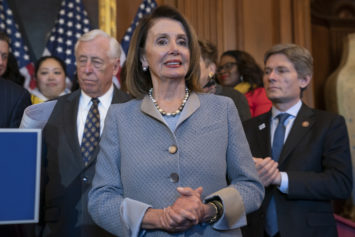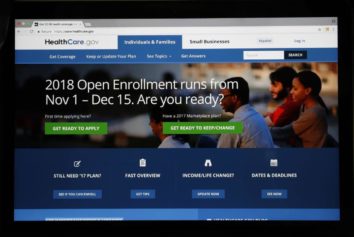
In this Aug. 1, 2017 photo, Sen. Ron Johnson, R-Wis., chairs a Senate Foreign Relations subcommittee hearing on Steve King, a prominent GOP insider from Wisconsin, nominated to be ambassador to the Czech Republic, on Capitol Hill Washington. An intriguing new theory is gaining traction among “Obamacare’s” conservative foes: The Medicaid expansion to low-income adults under former President Barack Obama’s Affordable Care Act may be fueling the opioid epidemic. If true, that would represent a shocking outcome for government policy. But there’s no evidence that’s happening, say university researchers who have long studied the drug problem. Some say Medicaid may be having the opposite effect, helping mitigate the epidemic. (AP Photo/J. Scott Applewhite)
WASHINGTON (AP) — An intriguing new theory is gaining traction among conservative foes of the Obama-era health law: Its Medicaid expansion to low-income adults may be fueling the opioid epidemic.
If true, that would represent a shocking outcome for government policy. But there’s no evidence to suggest that’s happening, say university researchers who study the drug problem and are puzzled by such claims. Some even say Medicaid may be helping mitigate the consequences of the epidemic.
Circulating in conservative media, the Medicaid theory is bolstered by a private analysis produced by the Health and Human Services Department for Sen. Ron Johnson, R-Wis. The analysis says the overdose death rate rose nearly twice as much in states that expanded Medicaid compared with states that didn’t.
Independent experts say the analysis misses some crucial facts and skips standard steps that researchers use to rule out coincidences.
Johnson has asked the agency’s internal watchdog to investigate, suggesting that unscrupulous individuals may be using their new Medicaid cards to obtain large quantities of prescription painkillers and diverting the pills to street sales for profit. Diversion of pharmacy drugs has been a longstanding concern of law enforcement.
“These data appear to point to a larger problem,” Johnson wrote. “Medicaid expansion may be fueling the opioid epidemic in communities across the country.” He stopped just short of fingering Medicaid, saying more research is needed.
But if anything, university researchers say Medicaid seems to be doing the opposite of what conservatives allege.
“Medicaid is doing its job” by increasing treatment for opioid addiction, said Temple University economist Catherine Maclean, who recently published a paper on Medicaid expansion and drug treatment. “As more time passes, we may see a decline in overdoses in expansion states relative to nonexpansion states.”
Johnson is a conservative opponent of “Obamacare” who backed GOP efforts to curtail the Medicaid expansion. Wisconsin officials have urged him to push for changes in the health law to ensure the state wouldn’t be penalized for rejecting federal dollars to expand Medicaid.
Trump administration officials, including Health Secretary Tom Price and Seema Verma, head of the Centers for Medicare and Medicaid Services, have strongly criticized Medicaid, saying the program doesn’t deliver acceptable results.
The GOP health overhaul bills that failed to advance in Congress would have slashed program spending. Price’s agency would not answer questions about the analysis for Johnson, and released a statement instead.
“Correlation does not necessarily prove causation, and additional research is required before any conclusions can be made,” the statement said.
Translation: Just because something happens around the same time as something else, you can’t assume cause and effect. The statement said the administration is committed to fighting the opioid crisis.
Medicaid is a federal-state program that covers more than 70 million low-income people, from newborns to elderly nursing home residents and the disabled. Thirty-one states have expanded Medicaid to serve able-bodied adults, while 19 have not. The expansion went into effect in January, 2014, and the most recent national overdose death numbers are for 2015.
That leaves researchers with just a small slice of data. Both sides agree more research is needed.
Still, some patterns are emerging.
Prescriptions for medications used to treat opioid addiction in outpatient settings increased by 43 percent in Medicaid expansion states compared with states that didn’t expand, according to Maclean’s research with Brendan Saloner of Johns Hopkins Bloomberg School of Public Health. That indicates Medicaid is paying for treatment.
Maclean and Saloner also found another piece of the puzzle: Overdose death rates were higher to begin with in states that expanded Medicaid.
That’s important because it suggests that drug problems may have contributed to state decisions to expand Medicaid. States such as Ohio with high overdose rates might have wanted to leverage more federal money to help fight addiction
Maclean and Saloner looked at deaths from overdoses and fatal alcohol poisoning from 2010-2015, starting well before the Medicaid expansion. The HHS analysis for Sen. Johnson missed that underlying trend because it started with 2013 data.
When Gov. John Kasich, R-Ohio, talks about why he expanded Medicaid, “it has a lot to do with mental health and substance use disorders,” said Republican labor economist Craig Garthwaite of Northwestern University’s Kellogg School of Management.
Garthwaite finds the claim that Medicaid expansion fueled drug deaths “fundamentally flawed.”
Still another problem with the Medicaid theory is that it lumps all drug overdoses together. But illicit drugs — heroin and fentanyl — have been driving surges in deaths since 2010. A Medicaid card doesn’t provide access to illegal drugs.
“It’s worrisome because this is the type of numerical evidence that’s used to propose bad policy,” Garthwaite said.
Maclean, who reviewed the HHS analysis, said it seemed to rely on raw numbers without controlling for a range of differences among states, a standard technique.
Some researchers see hints that Medicaid expansion may be helping to mitigate the overdose epidemic.
Vanderbilt University economist Andrew Goodman-Bacon drilled down to the county level in an informal analysis. From 2010 through 2015, counties with the largest insurance coverage gains experienced smaller increases in drug-related deaths than counties with smaller coverage gains.
More research is needed to provide conclusive evidence.
Relying on faulty research is “dangerous,” said Maclean. “It can lead to bad policies and people’s lives are at stake here.”

